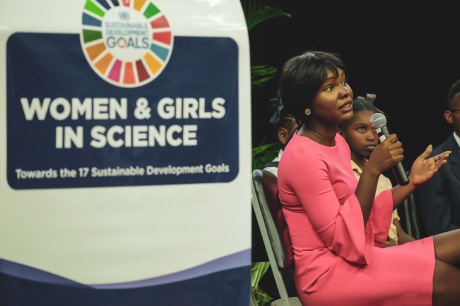The Physics of Plants with Teressa Alexander
“When I was growing up in the Caribbean, I never met someone who looked like me who was a scientist. I never saw it on TV. I never saw it portrayed in the media. I had never seen a black scientist.”

Teressa Alexander (Photo courtesy of T. Alexander)
In spite of a lack of role models, Teressa Alexander forged ahead, creating her own path and thus providing for others what she herself lacked. Alexander’s calling to the scientific community and science education was ignited during her undergraduate studies at Morgan State University in Baltimore, Maryland.
“I had a desire to come back to Trinidad to do something impactful. I always knew that I wanted to come back.”
Alexander’s interests surprisingly began in aviation. She wanted to be a pilot. After completing an Associate’s degree in aviation, she decided to branch out into other areas of learning, specifically engineering with the goal of one day working for NASA. This led her to pursue a Bachelor of Science in physics. While completing a summer internship at Harvard she was introduced to Dr. Stacey Combes, an associate professor at the time.
“This was my first time seeing a powerful female scientist as a Principal Investigator (PI). I’d never seen this kind of woman power in science before.”

Teressa Alexander taking seasonal measurements to observe parameters in photosynthesis in the international cocoa genebank (Photo courtesy of T. Alexander).
Alexander completed research assistantships at Johns Hopkins studying structural protein studies in cancer research and phase-collision correlation with cockroaches. At Harvard University, she investigated flight maneuverability in bumblebees with Dr. Combes. She published her first peer-reviewed article with Dr. Combes titled “Wing wear reduces bumblebee flight performance in a dynamic obstacle course”. As Combes was leaving Harvard to accept a teaching position at UC Davis, she introduced Alexander to other interesting labs and that is how she found her connection to plants.
Her research project before starting graduate school was based on using a plant model to explore bio-inspired approaches to create efficient aircraft pipelines. She was introduced to a lab working on a project on xylem function, which turned out to be very physics-oriented as they investigated fluid movements in plants in response to drought stress. This evoked in her, a real interest in plants and redirected her focus into incorporating physics into the study of plants with an emphasis on tropical plants.
Her initial interest became filled with purpose as she realized that there was a great opportunity to impart this knowledge on youth in underserved schools and communities in science back home in Trinidad.
“I come from a tropical country and agriculture is very applicable back home. I loved microscopy, looking at the different structures, and understanding their functions. Coming to the end of my fellowship at Harvard, I realized I wanted to continue studying plants where biodiversity is highest. Biodiversity is highest in tropical regions, so I went back home to pursue my Ph.D.”
As a double minority and immigrant pursuing higher education in the United States, Alexander experienced her fair share of challenges as a Black Trinidadian woman in science. From racial profiling by patrolling police to being second-guessed on her abilities in male-dominated research labs, she has been through it all. Through her experiences, she is acutely aware of the complexities of why Black people and more specifically black women tend to be discouraged from working in academia, specifically on agriculture and plants, as well as the issue that agriculture isn’t brought to the Black community as a viable option. For Black Americans, it can be a reminder of “going back to the plantation,” Alexander explained. She wants to reverse that trend and have people understand the importance of getting minority students interested in plants, understanding how important farming is, learning how climate change can impact agriculture for this generation, and bringing excitement and curiosity to a sorely needed field of study.

Teressa Alexander looking at xylem vessels in the petiole of a leaf inserted in a pressure chamber (Photo courtesy of T. Alexander).
Her current Ph.D. research focuses on drought tolerance in Theobroma cacao trees under climate change.
The effects of climate change on agriculture naturally will be spatially heterogeneous and certain regions, such as small island nations like Trinidad and Tobago, will be at greater risk and face a greater challenge. Rising sea levels and extreme meteorological events make countries like Trinidad especially vulnerable. The cacao crop has been an economic mainstay and greatly contributed to the socio-economic development of the country for over 200 years. There are 2,400 varieties of cacao and Alexander is investigating drought tolerance as a desirable trait in the hybrids used commercially. Cocoa beans are the principal raw material for chocolate production.

Teressa Alexander speaking at the Women and Girls in Science Caribbean Symposium event, 2019. Alexander was a student honoree (Photo courtesy of T. Alexander).
It is important, now more than ever, to create space for Black voices. This is one of the reasons why Alexander co-founded STEMNoire, a scientific research conference and retreat for women within the African diaspora. Further, in an effort to amplify Caribbean voices in STEM, she founded STEM Caribbean Media. Her goal is to contribute to the significant upliftment of women and girls in science and continue building a network of Caribbean STEM professionals.
-MK

